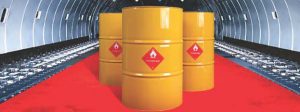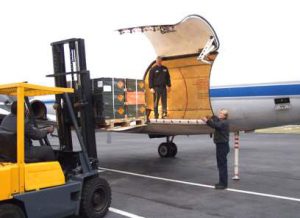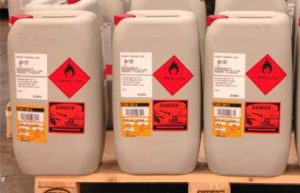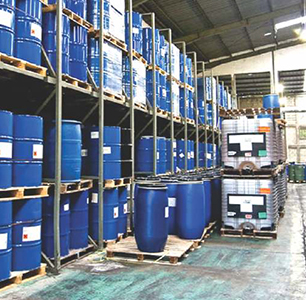The Science & logic behind chemical logistics
Hazardous materials, either in raw or finished form, require special people and skills to be transported and stored safely. It needs the science of chemical logistics which involves knowledge, experience and specialized equipment. These materials come in different forms—biological, chemical, radiological and/or physical, which have the potential to cause harm to humans, animals or the environment.
When left to untrained hands, transporting these materials can potentially result to explosion, ignition, emitting toxic gases, among others, that may cause serious health damages to humans who come in contact with them or even damage the environment.
Chemical logistics, thus, require unique shipping requirements because of the inherent danger and potential impact on health, security and the environment.
The global forecasted market of chemical logistics is all set to go up at a CAGR of 11.97% between 2016- 2020, according to Sandler Research.
Air Cargo Update got the opportunity to talk with Chemical logistics experts from Dupre Logistics, RSA-TALKE and Schmidt ME Logistics to discuss how to handle chemicals in a warehouse cautiously.
According to RSA-TALKE, the chemical industry in the Middle East is growing while other parts of the world are stagnating. Consequently, the region is preparing for the growth.
Dr. Wolfgang Hoppmann, CEO of Schmidt ME Logistics, said, “It is a fast growing market with many opportunities. New technologies create alternative handling methods, which are faster, safer and more cost effective than the current labor intensive methods currently used in the Middle East.”
RSA-TALKE stores and transports full range of chemical classes except explosives, radioactive material and infectious substances.
Schmidt ME Logistics transports all kinds of bulk chemicals, resin powder commodities as well as minerals, flour, rice, wheat and sugar.
Hazardous handling
Safety is a serious business for the chemicals industry. Because of this, companies in chemical logistics always make sure they are not spilled or tampered with during transit.
Those who handle hazardous loads must also be properly trained, certified and equip to understand all the safety requirements for the kind of products that they are shipping.
“All training is provided by in-house specialist focusing on safe working methods, no spill allowed and wearing the correct PPE. Our in house specialist has all been trained in Germany,” notes Dr. Hoppmann.
Markus Koepsel, General Manager, RSA-TALKE, said: “We use the behavior-based safety (BBS) approach. Training sessions based on this principle encourage employees to ‘think safety’ and to always actively seek it out from day to day. We also do chemical specific product handling training.”
Mike Matte, Senior Director of Business Development, Dupré Logistics, notes, “Every team member is required to be trained and pass the curriculum testing in all aspects of company safety standards that meet and often exceed Federal Law (including drug and alcohol testing, chemical and hazmat materials handling, labeling and transport, and several other topics pertaining to the most rigorous safety expectations).
“Our HAZMAT and hazwaste drivers are certified and provided with ongoing training that meets and often exceeds government regulations to deliver the most hazardous materials safely”.
Chemical containment solutions
It takes great care to keep hazardous loads safe and secure, it requires specialized equipment to move any kind of chemical, hazardous or not. Different chemicals have different properties, needing it to match with the right container.
Schmidt ME Logistics only facilitates dry products, thus, liquids and gas are not part of its portfolio.
“We have multiple solutions in the UAE such as bulk container trucks, special liners for containers and have our own warehouses in Bahrain and Kizad AD which have specialised silos and warehouses to support. Here we also change large shipments into smaller loads as required by customers. These silos are also equipped with special duct filters to enhance the process,” said Dr. Wolfgang.
RSA-TALKE facilities have been designed to include containment systems: containment tanks, leakage trenches (to segregate the chemicals in the event of a spill).
“We also have special containment equipment depending on the packaging or product being handled like for IBCs, example over-drums,” Koepsel said.
RSA-TALKE handles the full customs clearance, and depending on the product special approval from various authorities may be sought, as theirs are one of the few authorized facilities designed to handle certain types of products.
Schmidt ME Logistics follows all rules and procedures as stipulated by the government, with a well-trained team, which specializes in all doctrines concerning mainland or free zone rules.
Handling challenging substances
RSA-TALKE facilities have been specially constructed to cope with hazards in the unlikely situation that there is an issue.
“Our experienced staff have also been trained to contain any waste. But more importantly, we take several precautions to prevent these situations from arising in the first place,” states Koepsel.
“We always want to contribute to raising the current standards for environmental safety in order to create a more sustainable working environment, which in turn will reduce the challenge of handling hazardous materials,” he added.
RSA-Talke’s general manager also noted their company has installed LEDs and sensors for energy saving and is also trying a pilot for solar paneling.
“We use ATEX certified equipment. Our fire fighting system is on par with NFPA standards,” he said.
Schmidt ME Logistics, meanwhile, said it handles chemicals using special bulk trailers and containers.
Shipping requirements
The key packaging methods and materials are always specified in the international acknowledged MSDS data sheets of the products.
Should the wrong packaging materials or methods be used, it can possibly lead to damages, or spills which could make the product a waste. This in turn will lead to environmental hazards and other pollution problems which are often difficult to clean up.
“Different materials have different rules and procedures. We take no short cuts and follow all rules and procedures as indicated by the government and the supplier of the products and more. In addition we ensure that all vehicles and equipment used are in perfect condition with regular checks and services. Each load is checked and documented and if any risk is identified the load is blocked,” says Schmidt’s CEO.
Material Safety Data Sheet (MSDS) needs to be analyzed and accordingly the right container is chosen for holding the product. Additionally, adequate packaging, load securement and correct material handling equipment are the main shipping requirements for RSA-TALKE.
Chemical transportation
RSA-TALKE follows Gulf SQAS standards for transportation. “We are also working on getting the ADR regulations in place for land transportation to raise the standards for chemical transportation by land. Both of these standards are being promoted by the GPCA and we are currently working on a task force with the GPCA for the same. For air and sea freight we are following IMDG and IATA regulations, respectively”.
Dupré Logistics provides a variety of logistics and transportation services, as evidenced by its broad range of trailing equipment, including crude, chemical and gasoline tankers; dry and temperature-controlled vans; reefers; and flatbeds.
“Dupré designs a logistics solution that considers shippers’ various needs, and typically results in custom-building equipment for that application. When transporting chemicals we comply with all of the safety regulations set forth by the US government. Through our work with the Trucking Alliance we also work with other truckers to advocate for safer drivers and roads for our industry,” says Matte.
Safety procedures
Schmidt Logistics is fully ISO9001; ISO14001 and OHSAS 18001 compliant and conform to these rules and in some cases more.
RSA-TALKE has stringent HSSEQ standards that are international grade and the highest in the industry, as well as specialized infrastructure for maximum compliance.
With increased use of technology to follow shipments in transit, it is no longer a novelty for orders to be tracked from the time they are placed to the moment they are delivered. The sensitive nature of the materials being shipped makes robust tracking critical.
The benefits of adopting technology include the ability to automate freight execution and payment, receive notifications for important events along the way, and access centralized information, which facilitates tracking.
RSA-TALKE monitors chemical shipments against Gulf SQAS standards and some specialized internal programs that have been devised.
Schmidt ME Logistics uses GPS tracking on all its vehicles, with full checks before and after each load to ensure all equipment’s are in good condition.
“All our staff is issued with the correct safety gear and regular checks are done to ensure all procedures are correctly followed. Documents are also completed to monitor this,” he says.
Safety and adaptability
Schmidt ME Logistics uses warehouses and silos but it is to be noted that they mostly handle dry chemicals or powders only. For this kind of chemicals, there are specifics in terms of sprinkler systems, fire water containment, safety showers, and product containment regulations.
RSA-TALKE easily adjusts to shifts in the market by trying to act as partners to its customers, to help them anticipate industry trends and adapt accordingly to better deliver to their customer.
Schmidt ME Logistics has ample storage space to cope with fluctuations, either to carry excess stock to cover for shortages or have ample space to cover for low sales.
Challenges faced
Numerous challenges have prompted specialty chemicals manufacturers to seek help from third-party logistics providers (3PLs) in recent years
.
Greater supply chain complexity; the need to comply with ever-more stringent trade, security, and environmental regulations; changing patterns of production and consumption; and the continual drive to operate more productively and profitably are just a few of those challenges.
“There are many challenges but the solution has always been to have the correct equipment, facility and well-trained staff to handle any challenge,” concludes Dr . Wolfgang.
RSA-TALKE’s integrated chemical hub for liquid bulk transportation and storing is a unique solution in the region.
“Due to our specialized facilities and systems, we are the only authorized storer of laden tanks. We also leverage the expertise of our parent companies, RSA and TALKE, through which we create sophisticated solutions which cover all customer requirements, including bespoke transportation and storage solutions,” concludes Koepsel of RSA-TALKE.


